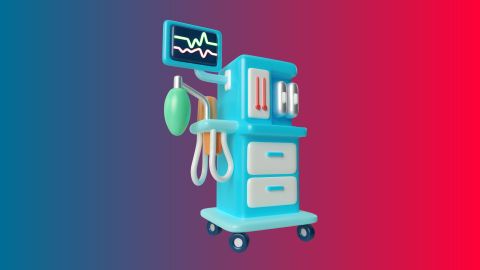Dialysis machines are a life-saving medical device used in the treatment of kidney failure. The machine works by purifying the blood of a patient who does not have functioning kidneys. Dialysis machines can be expensive, but there are options for financing available. In this article, we will explore everything you need to know about dialysis machines, including their working process, use, parts, pricing, and where to buy.
What is a dialysis machine?
A dialysis machine is a medical device designed to remove excess fluids and waste products from the blood of a person with kidney failure. These machines use a process called hemodialysis to remove waste from the blood and restore its balance of minerals and electrolytes.
How does a hemodialysis machine work?
The process of dialysis involves the use of a semipermeable membrane, which is a type of filter that only allows certain particles to pass through. In hemodialysis, the patient's blood is pumped into the machine, where it passes through the filter, which mimics the function of the kidneys. In parallel diagnostic practices, healthcare professionals may rely on advanced testing technologies like the cbc blood analysis to monitor overall patient health. The purified blood is then returned to the patient's body.
Types of dialysis machines
Dialysis machines are vital for patients with kidney failure as they remove waste and excess fluids from the body. The two primary types are hemodialysis and peritoneal dialysis.
Hemodialysis machines: These filter blood through an external dialyser and are most commonly found in hospitals and dialysis centres.
Peritoneal dialysis machines: These use the lining of the abdomen to filter waste and are often suitable for home use, including portable models designed for overnight therapy.
Today, patients can choose between in-clinic machines and home-based options, allowing greater flexibility and comfort based on individual health conditions and lifestyle needs.
Safety features of dialysis machines
A dialysis machine works like an artificial kidney and is equipped with several safety mechanisms to ensure safe treatment:
Air bubble detection: Prevents air from entering the bloodstream.
Leakage monitoring: Identifies any blood leakage within the system.
Blood pressure control: Maintains safe pressure levels inside the machine.
Dialysate temperature check: Ensures the fluid is not too hot or cold for the blood.
Dialysate quality check: Monitors conductivity to confirm the dialysate mixture is accurate.
Use of dialysis machines
Dialysis machines play a crucial role in managing kidney failure, a condition that can arise from various diseases such as diabetes or glomerulonephritis. Patients suffering from kidney failure often rely on dialysis treatment to remove waste products and excess fluids from their blood when their kidneys can no longer perform this function adequately. Emergency preparedness in dialysis centres also includes lifesaving devices such as an aed defibrillator to address sudden cardiac events during treatment. Dialysis can be administered either at a specialised centre or within the comfort of the patient's home, facilitated by portable dialysis machines. This flexibility allows patients to receive necessary treatment while maintaining a semblance of normalcy in their daily lives.
- Dialysis machines are essential for managing kidney failure resulting from diseases like diabetes or glomerulonephritis.
- Treatment options include dialysis at specialised centres or in the patient's home.
- Portable dialysis machines offer the flexibility for home-based treatment, allowing patients to receive necessary care while maintaining their routines.
Healthcare providers must also adhere to safety and compliance standards set by agencies like cdsco when installing and operating dialysis equipment in medical facilities.
Parts of a dialysis machine
The dialysis machine is a vital medical device that plays a crucial role in the treatment of patients with kidney failure. It consists of several essential components that work together to effectively clean the patient's blood. These components include:
- Blood pump: Responsible for pumping the patient's blood through the dialysis machine, allowing it to be filtered and purified.
- Dialysis solution or dialysate: A specialised solution that helps remove waste products and excess fluids from the blood during dialysis.
- Semipermeable membrane: Acts as a filter, allowing waste products and excess fluids to pass through while retaining essential substances in the blood.
- Waste collection system: Collects the waste products and excess fluids removed from the patient's blood during dialysis, ensuring proper disposal.
In many healthcare facilities, other imaging technologies like an ultrasound machine are frequently used alongside dialysis to monitor patient conditions and guide treatment.
Additionally, the dialysis machine is equipped with sensors and monitors that continuously monitor various parameters, including blood flow, blood pressure, and electrolyte balance. These measurements are crucial for ensuring that the dialysis treatment is performed safely and effectively, with the patient's health and well-being as the top priority.
Applications of dialysis machines
Dialysis machines play a crucial role in kidney care and are used across different medical settings:
Nephrology clinics: Used to provide regular treatment for patients under specialist supervision.
Dialysis centres: Operate on a larger scale, managing scheduled treatments for multiple patients daily.
ICUs: Support critically ill patients who require urgent or continuous kidney function assistance.
Home care: Compact and portable machines allow patients with chronic kidney disease to undergo safe treatment at home, offering greater comfort and flexibility.
In every setting, dialysis machines help stabilise patients’ health and enhance their overall quality of life.
Dialysis Machine Prices
Explore a range of dialysis machines with varying features and prices to suit different healthcare needs. From the B BRAUN Dialog+ Hemodialysis Machine to the Nipro Diamax Brand New Dialysis Machine, discover options designed to deliver efficient hemodialysis and CRRT treatments. Compare prices and specifications to make an informed choice for your healthcare facility.
Dialysis Machine |
Price in INR |
B BRAUN Dialog+ Hemodialysis Machine |
Rs. 1,182,451 |
B BRAUN Diapact CRRT Dialysis Machine |
Rs. 1,396,147 |
Fresenius Hemodialysis Machine, Model: 4008s |
Rs. 797,798 |
Fresenius Dialysis Machine 5008S |
Rs. 1,540,000 |
Nipro Diamax Brand New Dialysis Machine |
Rs. 550,000 |
For patients with severe cardiac complications undergoing dialysis, incorporating a support device like a balloon pump can improve hemodynamic stability during treatment.
Financing options for buying dialysis machines
Business owners who consider investing in a dialysis machine need financing. Financing options such as loans, including a professional loan, are readily available from Bajaj Finserv Medical Equipment Finance that provides healthcare providers with the financial support they need to invest in state-of-the-art medical devices and equipment. Business owners can take advantage of these options to invest in dialysis machines and enjoy the benefits that come with owning one.
Conclusion
Dialysis machines are a crucial investment for patients with kidney failure and offer life-saving treatment to those affected by this condition. Dialysis machine procedures can be done in the dialysis centre or at home, depending on the patient's needs. While these machines can be expensive, there are financing options available to make them more accessible to healthcare providers and dialysis centres. When purchasing medical equipment like a dialysis machine, it is essential to consider factors such as cost, features, manufacturer reputation, and available financing options to ensure compliance with regulatory standards and ensure top quality. Explore options for financing medical equipment through Bajaj Finserv Doctor Loan to learn more.




